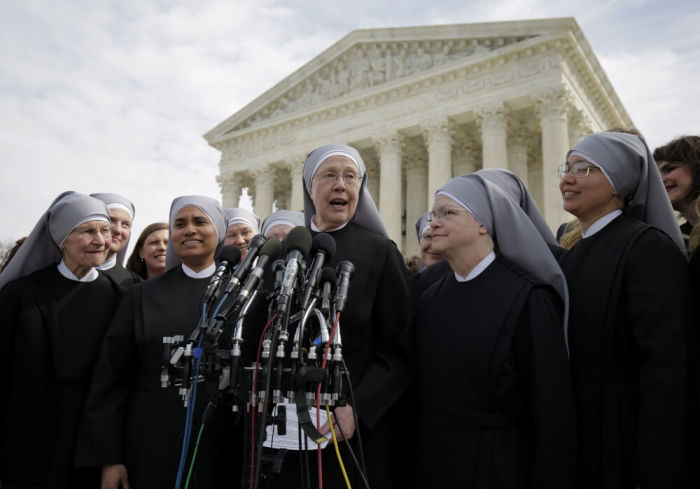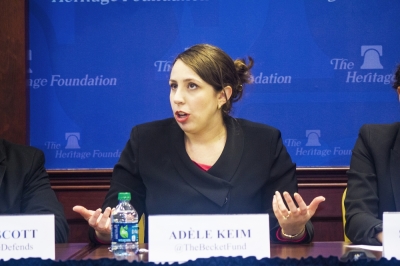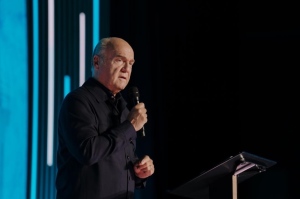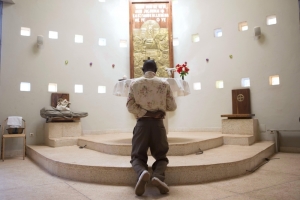Obama's Contraceptive Mandate Clearly Weak, Little Sisters' Lawyer Says After Supreme Court Arguments (Interview)

They have made a personal vow to God and to the elderly poor. With a joyful and humble spirit, the Little Sisters of the Poor are nuns who have dedicated their lives to ensure the frail elderly are treated with dignity and respect until they take their last breath.
The Little Sisters have a rich history of service that spans 175 years and 31 countries, serving more than 13,000 elderly poor. Yet today, these nuns find themselves petitioning the highest court of the land for justice in a case that reads like a modern-day David versus Goliath match.
The Little Sisters are undoubtedly David, driven by their mission to serve, while the U.S. Department of Health and Human Services (HHS) is the giant demanding the Sisters compromise their Catholic faith to comply with an imposed health care mandate that goes against their religious beliefs.
To sort out these complex issues of law, liberty and health care policy, we turned to attorney Adèle Keim who serves with public interest legal firm The Becket Fund — representing the Little Sisters of the Poor in this legal battle. She gives insights on why this case matters for every American, particularly those who hold convictions on the pro-life and religious liberty causes.
Bound4LIFE: Could you briefly describe the Little Sisters of the Poor case — who are the parties and what do they want decided?

Adèle Keim: Right now, the Little Sisters of the Poor find themselves in a situation where the government is forcing them to provide services in their health plan like the week-after-pill — which violates their religious beliefs. They are just one of many different religious groups before the Supreme Court on this issue.
Actually hundreds of evangelical religious groups represented by GuideStone, a major Southern Baptist health plan that serves only religious non-profits and churches, have come into court hand-in-hand with the Little Sisters. They too do not want to have their religious health plans deliver the week-after-pill to people working for religious nonprofits that aren't exempted.
Bound4LIFE: What are your thoughts on oral arguments last week, as the eight Supreme Court Justices finally heard the Little Sisters case?
Adèle Keim: It was a lively debate inside the court. It was striking to hear both Justice Anthony Kennedy and Chief Justice John Roberts repeatedly ask the Solicitor General to answer why the government was "hijacking" the Little Sisters' health plan, to use their words.
It's such an important point because the Little Sisters aren't just objecting to paperwork; they object to their Catholic conscience-compliant health plan being used as a vehicle to deliver contraceptives. The Solicitor General even admitted to the sincerity of the Little Sisters' religious beliefs, that participating in the government scheme would make them complicit in sin. It becomes very clear the government's case is weak.
Outside the court was an atmosphere of joy. Over 200 nuns and members of various religious orders, students and dozens of young pro-life advocates from across the country came to support the Little Sisters. Photos indicate religious liberty advocates represented about 80 percent of those gathered.
Bound4LIFE: What impact would the HHS mandate penalty have on the Little Sisters' charity work?
Adèle Keim: Overall, the penalties burdening the Little Sisters would amount to about 70 million dollars every year. It adds up to 100 dollars per day per employee, based on the current government mandate penalty. Such huge government penalties would be a crippling blow to this organization.
Bound4LIFE: President Obama promised often that, "If you like your health care plan, you can keep it — period." Yet while some pre-existing health plans were exempted, there seems to be an intentional effort to force these abortion-related services on faith-based nonprofits?
Adèle Keim: One in three Americans are not covered by the HHS mandate. That includes large corporations like ExxonMobil, Visa Inc. and PepsiCo, which were exempted from the mandate for reasons like cost or convenience. In fact, the government does not even require our own military to provide cost-free services through their family insurance plan TriCare. Big cities, like the City of New York, are also exempt from providing cost-free services.
However, the government's requirements are quite clear. In actuality, the government has narrowed in on groups like Little Sisters of the Poor like a laser beam. They've made concessions to other nonprofits that are not religious (like the City of New York), but they've narrowed in their focus on religious nonprofits.
Bound4LIFE: What do you think is the government's central goal with this mandate as it pertains to religious organizations?
Adèle Keim: The Obama Administration has changed their rules for religious nonprofits eight times in the past five years, usually in response to court rulings where they lost in court and then had to make health care policy changes.
But the government has never abandoned their central goal, which is to force groups like Little Sisters to convert the health plan they created — in order to serve and benefit their employees — into a vehicle for delivering services the Little Sisters object to.




























